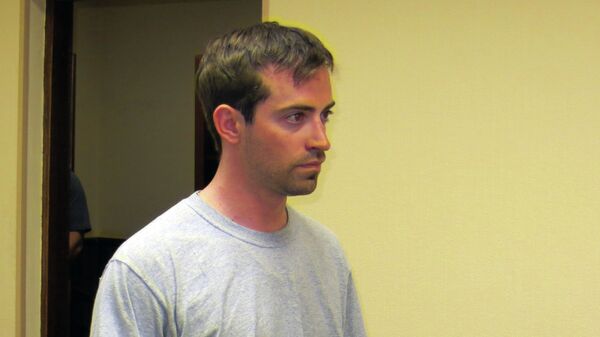WASHINGTON, May 17 (By Carl Schreck for RIA Novosti) – Russia’s decision to publicly identify a purported top US spy in the country is an “unprecedented” move in relations between Moscow and Washington with no clear indication of how the United States will react, former US Central Intelligence Agency (CIA) officers and security experts told RIA Novosti on Friday.
“Certainly throughout the Cold War, and even after that, there was a practice of not naming the head of the [spy agencies] in the respective countries,” said Peter Earnest, who operated intelligence collection and covert operations in Europe and the Middle East during a 35-year career with the CIA.
Earnest and other security experts said they were puzzled by the television interview in which a man identified as an officer with Russia’s Federal Security Service (FSB) named an alleged CIA station chief in Moscow.
In the interview with state-run television, the FSB officer explained that his agency detained purported US spy Ryan Fogle in Moscow earlier this week because a request in late 2011 to the purported station chief, whom he identified by name, to halt “provocative” CIA efforts to recruit Russian intelligence agents went unheeded.
Britain’s Daily Telegraph newspaper reported that “a diplomat of the same name [given by the FSB official] is listed as a Counsellor in the US Moscow embassy in the autumn-winter 2012-13 edition of a directory of foreign diplomatic, media and business offices in the city.”
Neither the US State Department nor the CIA responded to requests for comment Friday.
The leak of the purported spy’s name represents a “serious breach” in protocol, said Melvin Goodman, who served as division chief and senior analyst at the CIA’s Office of Soviet Affairs in the 1970s and 1980s.
“These things are usually done quietly,” Goodman told RIA Novosti on Friday, adding that the release of the name is “unprecedented” in the history of US relations with Russia and the Soviet Union.
Disclosure of a CIA operative’s name in such a fashion is typically a death knell for the agent’s career, Goodman added.
“He could stay operational clandestinely, but I don’t see how they could send him out under any cover,” he said.
Mark Galeotti, an expert on Russian security services at New York University, called the naming of the alleged station chief a “definite escalation” in the wake of Fogle’s brief detention and subsequent eviction from Russia, where he served as a third secretary in the political section at the US embassy.
“It’s almost as if the Russians are inviting the Americans to respond, but as it is they seem to have Washington off balance,” Galeotti told RIA Novosti. Without the full picture of the circumstances surrounding Fogle’s detention and the public naming of the purported station chief, it is difficult to predict how Washington might respond, Earnest and Goodman said.
If Russia’s reaction was indeed precipitated by CIA operatives’ aggressive attempts to recruit Russian intelligence officers, Washington “may just decide to let it go,” Goodman said.
“But without knowing what some of the operational details are, I would hesitate to speculate on this,” he said.
It was not the first time that the name of an alleged CIA station chief had been publicly disclosed in recent years. In 2010 and early 2011, US officials accused Pakistani authorities of leaking the name of two CIA station chiefs in Islamabad to the country’s news media within five months.
Earnest, however, noted that Washington’s relationship with Pakistan is considerably different than its ties with Russia, adding that there is no formal protocol dictating how countries should respond in these cases.
“It’s very situational, and the fact that you and I and the public don’t know what occasioned the takedown of Fogle means we don’t know what the signal [from Russia] was,” Earnest, founding executive director of the International Spy Museum in Washington, told RIA Novosti. “That makes it doubly hard to know the signal of this latest development is. It sort of deepens the mystery.”
Goodman, who spent 24 years as a CIA analyst specializing in Soviet affairs, said the spy spat surprised him given public overtures from both countries in recent weeks indicating they were interested in cooperating on the investigation of last month’s Boston Marathon bombings and bringing an end to the civil war in Syria.
“This past week suggests that something else is going on,” he said.


